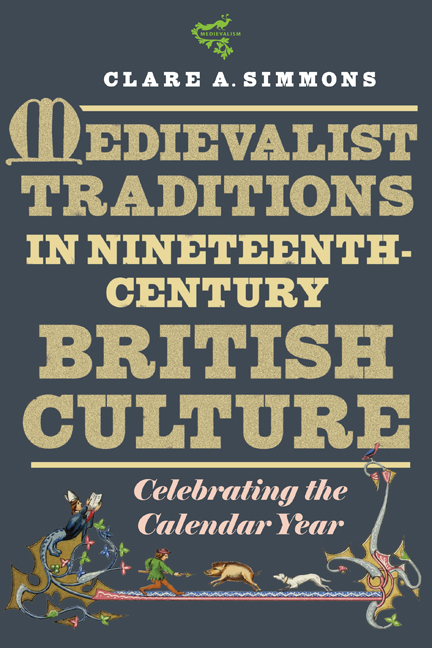Book contents
- Frontmatter
- Dedication
- Contents
- List of Illustrations
- Preface
- Acknowledgments
- List of Abbreviations
- Introduction: Medievalizing Time
- 1 The Christian and Not-So-Christian Year
- 2 Medievalist Calendar Experiments
- 3 Christmas Becomes a Season
- 4 Winter Love: St Agnes and St Valentine
- 5 Rites of Spring: Imagining Origins
- 6 Summer Festivals: Religion in Performance
- 7 Fragmented Autumn: Harvest-Home to Lord Mayor's Show
- Epilogue: Christmas Ghosts
- Bibliography
- Index
- Miscellaneous Endmatter
2 - Medievalist Calendar Experiments
Published online by Cambridge University Press: 09 February 2021
- Frontmatter
- Dedication
- Contents
- List of Illustrations
- Preface
- Acknowledgments
- List of Abbreviations
- Introduction: Medievalizing Time
- 1 The Christian and Not-So-Christian Year
- 2 Medievalist Calendar Experiments
- 3 Christmas Becomes a Season
- 4 Winter Love: St Agnes and St Valentine
- 5 Rites of Spring: Imagining Origins
- 6 Summer Festivals: Religion in Performance
- 7 Fragmented Autumn: Harvest-Home to Lord Mayor's Show
- Epilogue: Christmas Ghosts
- Bibliography
- Index
- Miscellaneous Endmatter
Summary
DURING THE FASHIONABLE years of the Christmas gift almanack, William Makepeace Thackeray experimented with writing novels in parts to create calendars, raising the question of how calendar time and narrative time might work together. Stubbs's Calendar; Or The Fatal Boots appeared in twelve chapters in The Comic Almanack for 1839. Each month has a title (almost invariably involving a pun) and illustration appropriate both to the characterization of the season and to a moment in the narrator Bob Stubbs's life: as he explains, “Twelve of my adventures, suitable for meditation and perusal during the twelve months of the year, have been arranged by me for this work.” In his narrative Stubbs repeatedly complains of his “ill-luck” – which he terms “the slugs and harrows of outrageous fortune” (163). Yet although he seems completely unaware that he has caused his own problems through deception and greed, he is acutely conscious of the relationship between his story and the calendar. In “January – the Birth of the Year” he includes a letter from his mother complaining of the expense that his birth has caused. “February – Cutting Weather” begins with Stubbs's own reflections on his chosen title and the calendar:
have often thought that January (which is mostly twelfth-cake and holiday time) is like the first four or five years of a little boy's life; then comes dismal February, and the working-days with it, when chaps begin to look out for themselves, after the Christmas and New Year's heyday and merrymaking are over, which our infancy may well be said to be. (166)
He starts at “Doctor Swishtail's academy” on a “bitter first of February”; this episode tells of the young Stubbs's schooldays, and how his skills in making the other boys indebted to him led to a flogging. Showery March leads him to contract for, but not pay for, the fatal boots. In April, “when spring begins to bloom” and Stubbs is a teenager, he makes a fool of himself by throwing over his pretty sweetheart for a wealthier woman seventeen years his senior. This lady he also abandons before his planned marriage of May 10, 1792 when he learns that she is a relative of the German bootmaker.
- Type
- Chapter
- Information
- Medievalist Traditions in Nineteenth-Century British CultureCelebrating the Calendar Year, pp. 39 - 61Publisher: Boydell & BrewerPrint publication year: 2021



